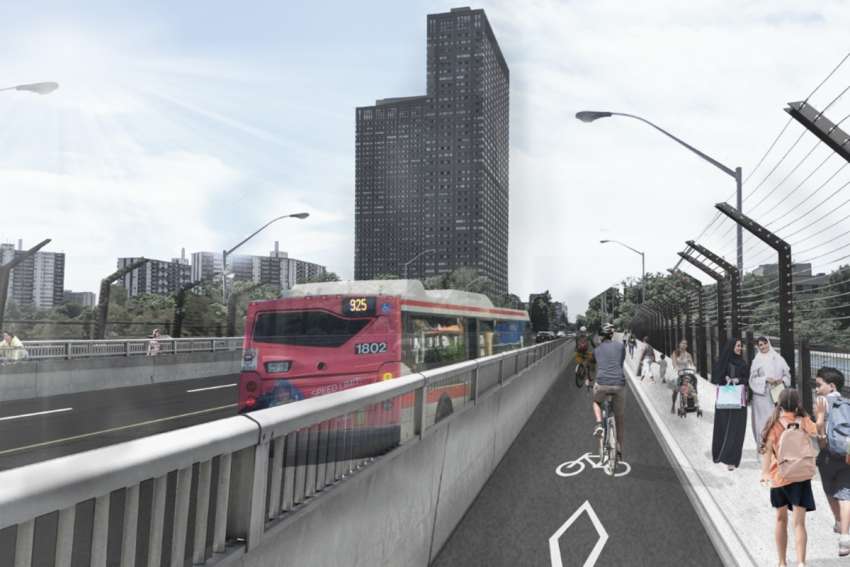Inside schools, the course tends to get thrown at any teacher on the grounds that anyone can teach citizenship. What little support these teachers receive is declining or being outsourced.
So instead of citizenship being the responsibility of the whole school or the whole system, it is no one’s responsibility. In our best summation, this approach does as much intentional harm as it does accidental good; at worst, it is doing more to undermine students’ innate sense of citizenship than doing nothing at all would.
In the fall of 2020, high school teacher Tim Langford challenged his students to design a solution to a long-standing problem for everyone in Toronto’s Thorncliffe neighbourhood, a dense cluster of high-rises that are home to thousands of newcomers and low-income families. Overlea Bridge, which students crossed to reach school, was unsafe. Each morning and afternoon, kids crowded onto its narrow sidewalks, caught between speeding drivers and a precipitous drop into the valley below. Parents worried, but politicians dithered.
Over the course of the next two years, the broader community and elected officials coalesced around the student learning and advocacy sparked by their teacher’s challenge. The teens worked as a class for months then presented their design solutions to city councillors, their MP and MPP, the media, and finally to the decision-making body at City Hall.
Things started to get done. In the spring of 2021, a prominent architecture firm, inspired by the student ideas, designed a safer baluster for the bridge that was later installed. The following summer, the city itself was stirred to action and completed overdue repairs to the bridge, while committing to a complete infrastructure update.
More than a feel-good class project from a marginalized community, this is a story about the potential of what effective citizenship in school communities can accomplish, and, more deeply, how the convergence of learning and citizenship can help cure some of what ails our weakening democracy and fragile planet.
We offer two more school systems that work against the grain of traditional schooling because they know that a radical change in how and what students learn is key to saving both the future of children and the future of the planet. The Ottawa Catholic District School Board, with 45,000 students and 83 schools, has integrated citizenship with learning because they know that citizenship-based learning is the sine qua non of survival. Here are two among many examples from OCSB:
• Social Entrepreneurship Program (SEP) — deep learning opportunities for K-12 that develop global competencies to help students understand that they are global citizens and changemakers who have an impact on the world around them;
• Samaritans on the Digital Road — a community resource to help develop digital citizenship skills, incorporated into the K-12 curriculum with five lessons created specifically for each grade and delivered yearly.
We also work in California’s Anaheim Union High School District, which has 20 schools and 28,000 students. Eighty-two per cent of the district’s students live in poverty, including 1,650 students who are experiencing homelessness. The district’s core goal is about “compassion and citizenship.” In addition to doing well in school relevant to their own futures, Assistant Superintendent Jaron Fried says, “We want our students to better the community that they live in.”
“We have seen our students actively make impact on local community issues while they are students,” said Fried.
There are a growing number of community-minded students in action at Anaheim.
Some common threads across our examples: the centring and affirmation of students’ agency and democratic power; the guiding principle that everything is connected (the first law of ecology), and that connections in and around schools matter most for our purposes; and finally, the recognition that citizenship is not a narrow privilege but a broad responsibility for ongoing societal improvement. More than this, learning to improve oneself and one’s society through compassionate citizenship may be the holy grail that public education so badly needs to find its place in our complex and troubled planet. Let’s be clear: good schools and good citizens are one and the same. Our prosperity and survival depend on it.
It is not far-fetched to say that, in the not-too-distant future, we could find large numbers of citizen-minded schools in all kinds of settings where the community is better off because the schools make it so! Of course, community schools is a two-way street and a commensurate response is required from the social and built environments around schools. But we have no doubt that the new conception of citizenship baked into all schools in the district will causally improve the community — it will make the community and thereby society, better.
Last year Canada added a record one million people, mostly through immigration. Many of these newcomers come with their own interpretations and trauma around the term citizenship, and many will land in communities just like Toronto’s Thorncliffe with strong social ties but decaying infrastructure. These newcomers represent another potential pillar in the mission to reclaim citizenship, not just in schools but across society as a national project. Redefining citizenship as something deeper, more coherent and diverse can be part of a new Canadian agenda for learning and living together better than we did as a nation in our first two centuries.
(Josh Fullan is director of Maximum City. Michael Fullan is Global Leadership Director of New Pedagogies for Deep Learning. This was published in Principal Connections summer 2023 and this condesed version is reprinted with permission.)


